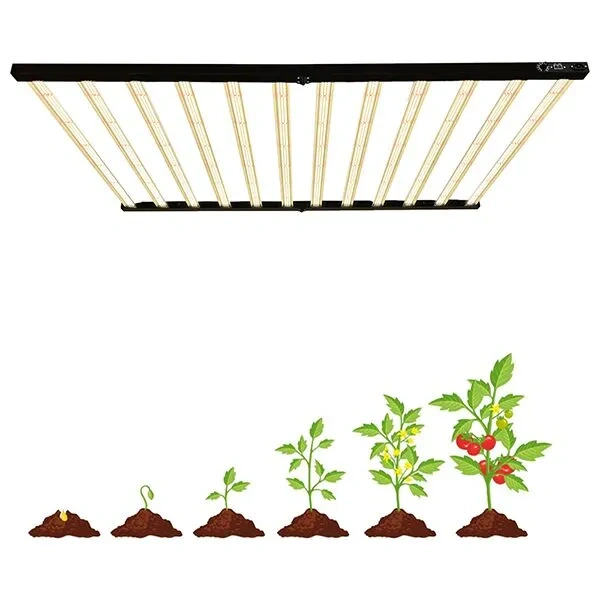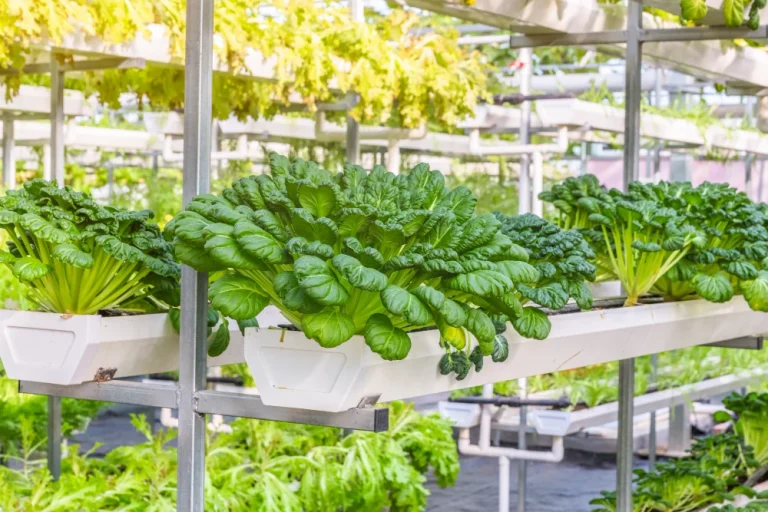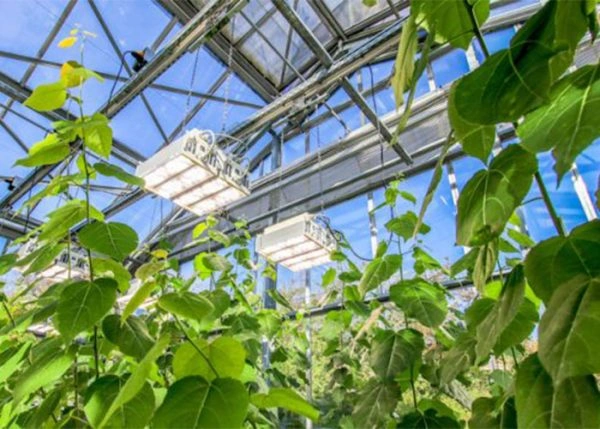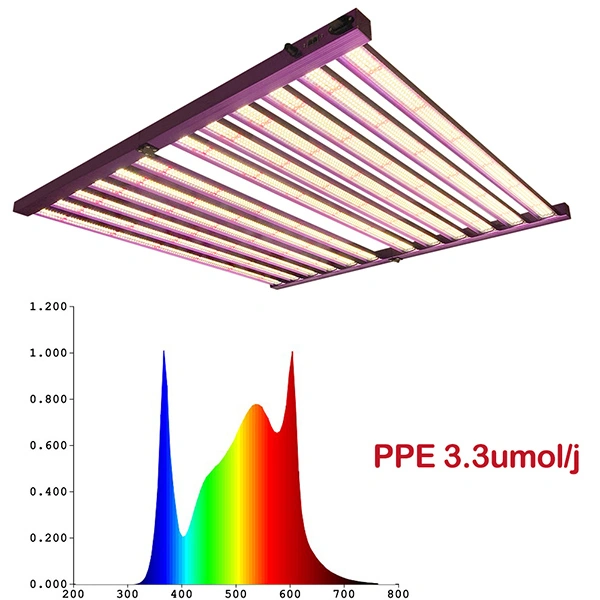What Makes Indoor Garden Lights Essential for Plant Growth?
The Role of Light in Photosynthesis and Plant Development
Light also aids plant growth by facilitating photosynthesis—a process by which plants use light energy to convert chemical energy stored in glucose molecules to energize their growth and reproduction. Not all sources of light are created equal to induce maximum photosynthesis and plant growth, however. This is where indoor garden lights become important.
The LED grow lights from TIDESTAR are crafted to improve photosynthesis by offering a spectrum of light that replicates natural sunlight effectively. The light spectrum offered by TIDESTAR usually encompasses the visible spectrum and extends beyond to include UV A and far red light as well. 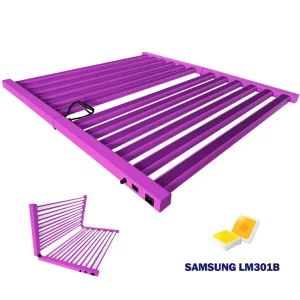 Unlike LEDs that concentrate mainly on limited red and blue spectrums, TIDESTAR’s lights present a wider range of colors to guarantee plants receive the ideal wavelengths required for different growth phases.
Unlike LEDs that concentrate mainly on limited red and blue spectrums, TIDESTAR’s lights present a wider range of colors to guarantee plants receive the ideal wavelengths required for different growth phases.
One instance is the TIDESTAR‘s 1000 watt LED Grow Light that utilizes Samsung LM301B and Osram LEDs for top-notch performance features with an efficiency of 3.1 Micromoles per joule delivering PAR output in comparison to other lights of its kind. With a broad spectrum consisting of 3000k and 5000k white light and 660nm red light this product caters to both the growth of leaves during the phase and flowering stages effectively.
Why Natural Light is Not Always Sufficient for Indoor Plants
Plants thrive when they are exposed to sunlight outside but face challenges when they are grown indoors due to factors like inconsistent light exposure and reduced daylight hours during winter months that can hinder their growth potential indoors in buildings where architectural style or shadows of nearby buildings may block essential sunlight for plants to grow in the optimal way and healthwise.
TIDESTAR’s indoor garden lights tackle these obstacles by offering adjustable lighting settings for plant growth consistency. The cutting-edge LED grow lights from TIDESTAR guarantee the distribution of Photosynthetic Photon Flux Density (PPFD) across expansive spaces. 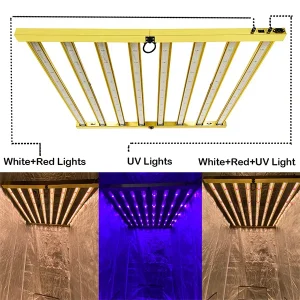 For example, the 800W UV/IR LED Grow Light features channel dimming control enabling users to tailor light levels for various growth phases. This ensures that plants get the right amount of light regardless of external factors.
For example, the 800W UV/IR LED Grow Light features channel dimming control enabling users to tailor light levels for various growth phases. This ensures that plants get the right amount of light regardless of external factors.
In addition to that point, TIDESTAR’s items are crafted for lastingness and effectiveness. Their LED lights last a time with around 90 percent of their original brightness at 35 thousand hours Which equals about 7 to 8 years of efficient use in regular situations. Also, features such as passive control of heat play a role in the preservation of the optimal working temperatures hence enhancing the life expectancy of the lighting apparatus.
What Should You Look for When Choosing Indoor Garden Lights?
Factors to Consider When Selecting Grow Lights for Indoor Plants
Light Spectrum and Wavelengths Suitable for Plants
When choosing plant grow lights, it’s important to have an awareness of the function of light spectrum and wavelength. Plants need spectrums of light to develop at different stages of growth. Blue light stimulates growth, for example, whereas red light is needed for flowering and fruiting. Full spectrum lights that replicate sunlight are optimal as they cater to all growth phases.
The LED grow lights from TIDESTAR are crafted with a balanced broad spectrum that includes 3000k and 5000k white light alongside 660nm red light plus UV A and far red wavelengths to provide the perfect blend of light, which is crucial for plant growth and photosynthesis requirements.
Coverage Area and Placement of the Light Source
The size of the area illuminated by grow lights is crucial for making sure that light spreads evenly throughout your garden space. Minimal coverage may result in plants growing unevenly due to some spots getting light than others. Furthermore, it’s important to position the source correctly in order to achieve optimal efficiency.
The TIDESTAR’s LED grow lights are designed to deliver PPFD, across wide spaces effectively. For example the TIDESTAR’s 800W UV / IR LED Grow Light provides channel dimming control and illuminates a large area with its eight bar layout. Its innovative thermal regulation mechanism directs heat to keep the plants cool and prevent overheating.
Furthermore, TIDESTAR’s products are crafted for installation and have adaptable mounting heights. Typically recommended for their fixtures is a height of least 15 cm above the tips of plants. This enables growers to customize the positioning according to the plant’s requirements while ensuring lighting conditions are maintained.
How Do TIDESTAR’s Indoor Garden Lights Support Healthy Plant Growth?
Key Features of TIDESTAR’s Indoor Garden Lights
Full Spectrum Lighting for Optimal Photosynthesis
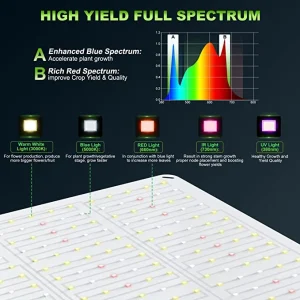 TIDESTAR’s indoor garden lights have been made to give plants a spectrum of light that imitates natural sunlight closely and effectively supports photosynthesis by providing the necessary wavelengths for plant growth and development at all stages.
TIDESTAR’s indoor garden lights have been made to give plants a spectrum of light that imitates natural sunlight closely and effectively supports photosynthesis by providing the necessary wavelengths for plant growth and development at all stages.
For instance, the Full Spectrum LED Quantum Grow Light Panel uses high-efficiency white light quantum boards with LM281B Samsung diodes. It can fine-tune the light intensity to meet the needs of specific plants, enhancing control and adaptability. Each LED has built-in dimming function as well as a daisy-chain feature.
Energy Efficiency and Longevity of TIDESTAR’s Lights
TIDESTAR’s indoor garden lights are designed to be energy efficient without sacrificing performance. The devices using Samsung LM301-based technology have an efficacy of up to 3.5 Μmol/J. Not only does this save a tremendous amount of energy, but it also makes them an eco-friendly option for indoor gardening enthusiasts.
Benefits of Using TIDESTAR’s Grow Lights for Indoor Plants
Promoting Faster Growth and Stronger Roots
TIDESTAR’s grow lights are made to speed up plant growth by giving them the amount of light they need consistently and precisely targeted lighting conditions for your indoor garden space to thrive well. This even spread of light ensures that all areas of your garden receive the necessary amount of light for healthy growth cycles with faster photosynthesis rates resulting in quicker plant development.
Enhancing Flowering and Fruiting in Plants
One major benefit of utilizing TIDESTAR’s gardening lights is how they can boost the blooming and fruit-bearing capabilities of plants effectively. The comprehensive range of light emitted by products plays a vital role in fostering bud growth and enhancing the quality of flowers during the flowering phase. TIDESTAR’s grow lights utilize both far red wavelengths to influence phytochrome responses that control the flowering cycles of plants effectively ensuring optimal growth and blooming results for your plants leading to abundant fruit production that surpasses expectations.
TIDESTAR’s dedication to quality and innovation and ensuring only the highest level of quality has established them as a brand among indoor gardening systems. By opting for our grow lights, you’re investing in cutting-edge technology that optimizes plant growth and enhances sustainable ways of growing food.
Frequently Asked Questions about Indoor Garden Lights
Q: What lights to use for an indoor garden?
A: Blue light or combined light bulbs are best for seed starting and leafy greens, and non-blooming houseplants. Red light or combined light bulbs are best for bud formation in blooming plants and for maintaining compact plants.
Q: What type of grow lights are best for indoor plants?
A: Full spectrum bulbs will usually be rated at 5000 to 6500 K, and will very closely match in color bright natural sunlight. Indoor plants, as they would outside in the sun, will usually perform their best under full-spectrum bulbs, which emit a balance of cool and warm light that mimics the natural solar spectrum.
Q: What is the difference between indoor and outdoor LED lights?
A: Outdoor lights are bi-directional and can be utilized indoors as well as outdoors, but indoor lights cannot be utilized outdoors on a continuous basis. Indoor and outdoor lights vary on the grounds that outdoor lights are water-proofed for use in wet places and shock-proof for adverse weather.
Q: Can grow lights replace sunlight?
A: There is no straightforward answer to whether sunlight or grow lights are best for your plants. Grow lights can, nonetheless, replicate the full spectrum of sunlight and enable indoor crops to be cultivated irrespective of local climatic conditions.
